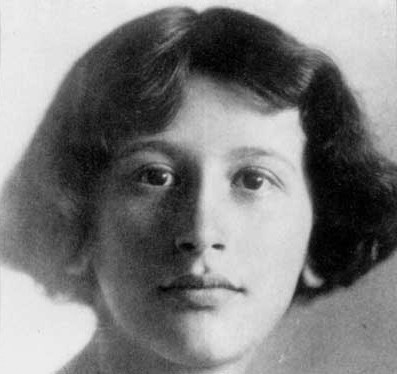As I wrote in another text, I think genius is a DIY or FIY (find it yourself), thing. Reading or being told by someone else that so and so is a genius is a second-hand thing.
Find and discover your own geniuses. And saints. You might have a couple around you, but if you rely totally on the Church to tell you who is a saint, you might be missing out. It is good exercise to learn to discover genius and sainthood.
It’s easy for me to talk, however, because I know a saint. He is still alive and as far as I know nobody has called him saint, so the discovery is mine. If that matters, which it doesn’t.
But it is a good feeling to actually know a saint. You can put to him your trickiest questions and can always count on a refreshing, painfully honest response.

But let’s leave the living saint and talk about a dead one. Or one who is now, partly though me, living her “true life”. (What I mean by that is explained HERE.)
Background: I read a lot as a teenager, and for many years. One of the books I picked up that made a great impression on be was “Gravity and Grace” by Simone Weil.
I have regarded it in very different ways through the years. When I first found it I was in the middle of a rather starry-eyed period. What Weil said about understanding without being understood, etc, touched a string in me, but I would say that the resonance had a lot with religious sentimentality on my part.
Later I regarded my teenage reading of Weil as something almost dangerous, as thoughts that went the wrong way and almost made me choke.
But the book has almost been on my mind. When I in 1998 tried to get a record contract with some “pop” songs, one of the lyrics went “I am an honorary member of the human race/ Torn between gravity and grace”.

Simone Weil died at the age of 34. As I understand it, Gustave Thibon, to whom Weil gave her papers and notebooks and who edited the book Gravity and Grace (Weil did not “write” it, as a book) played a crucial role in making her thoughts and ideas known. (I am thinking of Edmond Rostand, without whom and without whose play we would not know about, and love, the long-nosed cavalier and thinker Cyrano de Bergerac.)
Let’ s say that the book and I had an early meeting, separated, and, at least from my side (I have no idea what the book thought about me) regarded each other with suspicion.
But we have met again. Yesterday I printed a PDF copy of the book, the exact one that I read in my teens.
And now it seems we are ready for each other (meaning that I am ready for it). Much water has flowed in the Danube, years have gone by, new experiences have gladdened, saddened and softened me and I feel that I can understand Weil if not totally then at least better. I know what she speaks about.
And it seems to me that she also was a kind of saint.
Of course what she speaks about is religion, or rather, God and the absolute, versus the World and evil. Those question have taken on a gravity (sic) for me that, these days, is not academic but burning — on the skin of my soul.
I am no friend of forewords and introductions by meddling middlemen, but the introduction by Thibaud is in itself inspiring, which indicates (it takes one to know one) that he himself was close to the level of Weil.
Of course I would like to quote from the book but the rediscovery, and the digestion of it, is too recent. I have also not come farther than 20-30 pages into it. But that is enough to see that this time around we have a real meeting.
Let me end here with Thibaud, not Weil.
In order to kill the self we must be ready to endure all the wounds of life, exposing ourselves naked and defenseless to its fangs, we must accept emptiness, an unequal balance, we must never seek compensations and, above all, we must suspend the work of our imagination, ‘which perpetually tends to stop up the cracks through which grace flows.’ Every sin is an attempt to fly from emptiness. We must also renounce the past and future, for the self is nothing but a coagulation of past and future around a present which is always falling away. Memory and hope destroy the wholesome effect of affliction by providing an unlimited field where we can be lifted up in imagination (‘I used to be’, ‘I shall be’ . . .), but faithfulness to the passing moment reduces man truly to nothing and thus opens to him the gates of eternity.
PS: Actually there’s a bit more. Just as in my text about genius I advise the reader not to exclude himself from sainthood. Here it is not so much a question of “finding a genius in your own home, your own jungle, your own skin“, but of creating one.
Saints, I believe, are made, not born.
